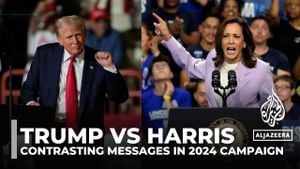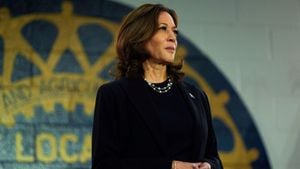The 2024 US presidential election is poised to be significant, not just for American voters but also for global markets. With the choice between Democratic candidate Kamala Harris and Republican nominee Donald Trump, the stakes are incredibly high as experts warn of potential repercussions across financial sectors worldwide.
The race has unfolded against the backdrop of notable volatility. Global markets are already feeling the tremors of political uncertainty, with investors bracing for what could happen next. Forecasts suggest a Republican victory might send stock prices soaring, providing newfound optimism among equity investors. Conversely, should Kamala Harris secure the presidency, analysts predict increased market nervousness and possible weakening of the US dollar.
Both candidates represent vastly different visions for the US economy and international trade. Trump’s agenda leans toward deregulation, potentially stimulating immediate financial growth but possibly causing heightened tensions with other nations. On the other hand, Harris's approach may promote stability through regulated growth, focusing on environmental policies but possibly introducing gradual shifts rather than radical changes.
Market sentiment is fragile. Leading up to the election, the US dollar has emerged as the safe haven, signifying anxious investors seeking security amid fluctuative conditions. Similarly, gold has seen monumental price increases, reflecting fears of uncertainty and potential downturns.
Historical data sheds light on how the stock markets respond to different administrations. Research highlights enhanced economic performance during Democratic presidencies, with figures from the University of Chicago indicating average GDP growth at 4.86% compared to just 1.7% under Republican control from 1927 to 2015. This pattern might suggest to investors the benefits of Harris' projected policies.
Trump's re-election, meanwhile, could inject immediate optimism, particularly across energy-driven markets. ATrumporatory suggestion hints oil prices might fall, creating benefits for consumers but potentially unsettling markets related to energy stocks.
Yet, political gridlock remains as another possibility. With the Republican Party potentially taking control of the Senate, even if Democrats retain the House, hindering policy change could lead to market stability, according to financial experts.
The repercussions stretch beyond American borders. The outcome of the US elections is expected to sway Indian markets significantly. Key sectors here—like IT, pharmaceuticals, and energy—depend on economic relations and trade policies initiated by the US administration. Changes at the top could dictate price fluctuations and market performance within these industries.
Investors are growing cautious, sensing the need to prepare for potential corrections as the election date approaches. Indications suggest they are actively reading the political pulse. Stocks typically rally during election cycles regardless of the victor; nonetheless, systematic corrections may follow the election results. Observations show periods of political gridlock often yield favorable market conditions.
A pivotal aspect to monitor will be how each candidate intends to navigate existing challenges, from trade negotiations to climate change. Each proposed path carries potential risks and rewards, rippling through both local and global economies upon establishment.
Post-election, the atmosphere will likely remain tense as analysts seek to assess long-term impacts based on new policies. Will Trump’s economic forecasts lead to headlines about growth, or will Harris usher forth changes aimed at sustainability?
Some experts argue for the necessity of bipartisan approaches to navigate looming crises. Matt Orton, Chief Market Strategist at Raymond James, emphasizes this, and believes finding common ground might help stabilize markets regardless of the election result.
This race is shaping up to be not just about candidates but about the broader global financial fabric. Regardless of who's declared the victor, the market effects will likely be immediate yet complex, with analyses extending well beyond election night.
Concerns remain over how international relations could shift under Harris's or Trump's administration. While Harris may push for renewed agreements focusing on climate and public health, Trump could revive isolationist policies affecting trade and tariffs. The latter might escalate tensions globally but promise immediate benefits to certain sectors.
Both candidates will need to tread carefully. The international community is watching closely, balancing their own economic crossroads whenever their election preferences are counted. Investors have already started recalibrations, workouts, and assessments of the risk-return scenario as ballots are cast.
To wrap up, as the election date draws near, the prevailing questions remain: How will the chosen president navigate the complex interplay of domestic policy and international relations? And how will investors react, not only to immediate changes but also to the longer-term shifts dictated by the outcomes?
With so much hanging in the balance, the global market’s eyes will be glued to the polls, eager to see what the future holds when the votes are tallied.



